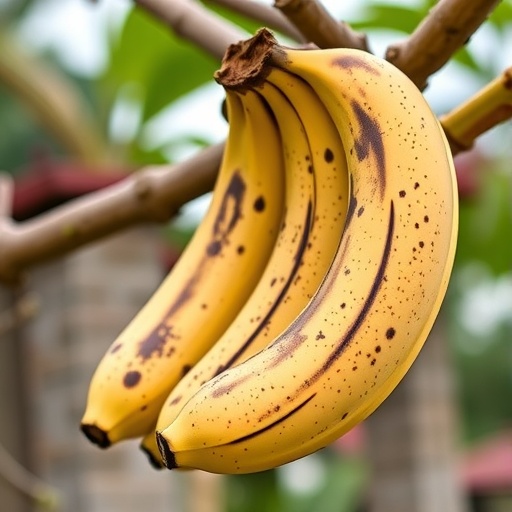Researchers have harnessed the power of transcriptomic analysis to uncover crucial defense mechanisms linked to resistance against banana blood disease, a significant threat to banana production globally. The study conducted by Thanyasiriwat and colleagues highlights the identification of specific genes that play pivotal roles in enhancing the resilience of banana plants against this devastating pathogenic threat. The findings offer promising avenues for future biotechnological applications aimed at fortifying banana crops, which are essential for food security and economic stability in many tropical regions.
As global demand for bananas continues to rise, the urgency to address diseases that afflict this vital crop has intensified. Banana blood disease, caused by certain viral pathogens, poses a substantial risk, leading to reduced yields and economic losses. In their study, the research team employed advanced transcriptomic techniques to profile gene expression in banana plants subjected to viral stress, revealing a complex interplay of defensive responses that seedlings evoke when under attack.
Through rigorous methodology, including RNA sequencing, the researchers identified a comprehensive set of genes that respond to viral infection. Among these, genes associated with hyper-sensitive response, programmed cell death, and oxidative stress management were notably activated in resistant banana varieties. These mechanisms are not only essential for plant defense but also crucial for understanding how bananas can sustain their productivity in the face of environmental stressors.
By analyzing the expression profiles of these defense-related genes, the study highlights potential genetic targets for crop improvement programs. Genetic engineering and traditional breeding practices can be leveraged to enhance these defensive traits in susceptible banana varieties. This research exemplifies the potential of genomics in transforming agricultural practices and breeding strategies, offering hope for sustainable banana production in regions where disease pressures are mounting.
The findings also underscore the importance of considering ecological factors in breeding strategies, as the interplay between the host, pathogen, and environment can significantly influence disease outcomes. A nuanced understanding of how various resistance genes function in tandem can inform breeding programs that aim to create banana varieties with robust defenses against a spectrum of pathogens, not limited to banana blood disease.
Notably, the researchers also discussed the implications of their findings beyond banana blood disease. The identification of these key defense genes could benefit broader agricultural practices across various crops facing similar biosafety challenges. For instance, crops such as maize, rice, and tomato could potentially be enhanced using similar transcriptomic analyses to identify genetic traits conducive to resistance against a wide array of viral pathogens.
The integration of advanced genomic techniques into agricultural research signifies a paradigm shift in how we approach crop resilience. Traditional methods of breeding, while effective, often require many generations to achieve desirable traits. However, with the knowledge acquired through transcriptomic studies, scientists can expedite the process, ensuring that crops are not only resilient but also capable of thriving under changing climate conditions.
The attention drawn to banana blood disease also shines a light on the broader implications of plant diseases on food security. With an increasing number of banana varieties being subjected to viral threats, the urgency for developing resistant strains has never been more critical. As such, this study serves as a clarion call for investment in agricultural research that harnesses cutting-edge technologies to safeguard staple crops.
Furthermore, collaborative efforts in understanding plant-pathogen interactions bring an interdisciplinary approach to addressing agricultural challenges. The synergy between molecular biology, genetics, and environmental science can foster innovations that mitigate the impacts of plant diseases on crops, ensuring nutritional security for growing populations.
In conclusion, the research led by Thanyasiriwat et al. presents a landmark step forward in combating banana blood disease. By elucidating the genetic basis of resistance through transcriptomic analysis, the study not only contributes to our scientific knowledge but also paves the way for practical applications that aim to protect one of the world’s most cherished and economically significant fruits. As agricultural challenges become increasingly complex, studies like this represent the hope and promise that science can offer in securing our food systems for future generations.
This research underscores the vital intersection of genomics and agriculture, where knowledge derived from molecular investigations can directly influence breeding methods and disease management practices. As countries seek to enhance food security, harnessing such scientific advancements will be crucial in building a resilient agricultural landscape capable of withstanding the complexities of modern agricultural challenges.
As the findings are disseminated within the scientific community and beyond, the tangible benefits of transcriptomic insights into plant resistance will likely resonate across a plethora of agricultural initiatives. It invites a re-evaluation of how we engage with and respond to viral threats in our crops, emphasizing the need for a proactive and informed approach to crop management.
Ultimately, what Thanyasiriwat and colleagues have accomplished is more than an academic contribution; it is a testament to the capabilities of modern science to confront old challenges with innovative solutions. As global agriculture stands at a crossroads, embracing such pioneering research will be paramount to developing foods that not only nourish millions but also remain resilient in the face of ever-evolving threats.
Subject of Research: Resistance to banana blood disease through transcriptomic analysis.
Article Title: Transcriptome analysis reveals key defense genes associated with resistance to banana blood disease.
Article References:
Thanyasiriwat, T., Sangdee, A., Rattanapolsan, L. et al. Transcriptome analysis reveals key defense genes associated with resistance to banana blood disease. BMC Genomics 26, 841 (2025). https://doi.org/10.1186/s12864-025-12056-0
Image Credits: AI Generated
DOI: 10.1186/s12864-025-12056-0
Keywords: transcriptome analysis, banana blood disease, resistance genes, crop improvement, viral pathogens.
Tags: banana blood disease resistancebiotechnology applications for banana cropscrop protection strategies for bananasdefensive responses in banana seedlingseconomic impact of banana diseasesenhancing resilience in banana plantsfood security and banana productiongenes linked to banana diseaseRNA sequencing in plant researchtranscriptomic analysis in bananastropical agriculture challengesviral pathogens affecting bananas





